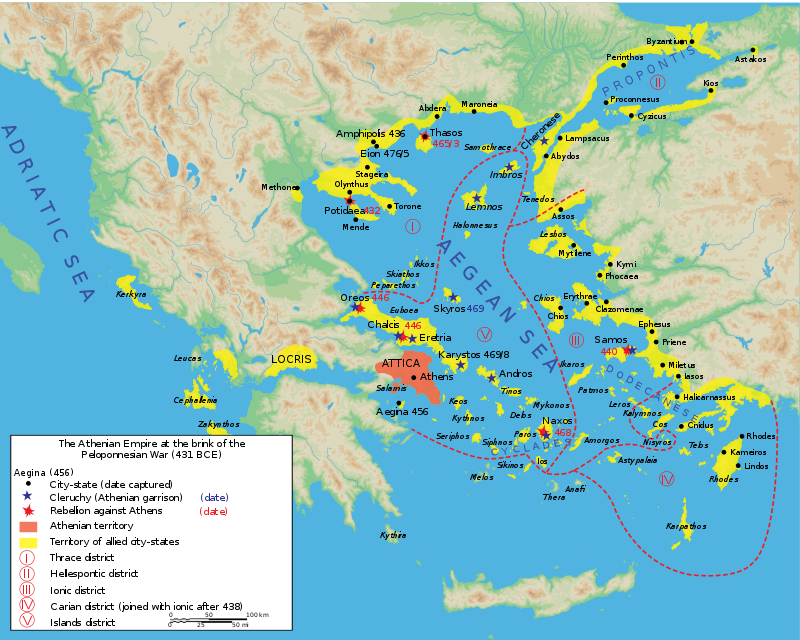The Greco-Persian Wars had their roots in the conquest of the Greek cities of Asia Minor, and particularly Ionia, by the Achaemenid Persian Empire of Cyrus the Great shortly after 550 BC. The Persians found the Ionians difficult to rule, eventually settling for sponsoring a tyrant in each Ionian city. While Greek states had in the past often been ruled by tyrants, this was a form of arbitrary government that was on the decline. By 500 BC, Ionia appears to have been ripe for rebellion against these Persian clients. The simmering tension finally broke into open revolt due to the actions of the tyrant of Miletus, Aristagoras. Attempting to save himself after a disastrous Persian-sponsored expedition in 499 BC, Aristagoras chose to declare Miletus a democracy. This triggered similar revolutions across Ionia, extending to Doris and Aeolis, beginning the Ionian Revolt.
The Greek states of Athens and Eretria allowed themselves to be drawn into this conflict by Aristagoras, and during their only campaigning season (498 BC) they contributed to the capture and burning of the Persian regional capital of Sardis. After this, the Ionian revolt carried on (without further outside aid) for a further five years, until it was finally completely crushed by the Persians. However, in a decision of great historic significance, the Persian king Darius the Great decided that, despite having subdued the revolt, there remained the unfinished business of exacting punishment on Athens and Eretria for supporting the revolt. The Ionian revolt had severely threatened the stability of Darius’s empire, and the states of mainland Greece would continue to threaten that stability unless dealt with. Darius thus began to contemplate the complete conquest of Greece, beginning with the destruction of Athens and Eretria.
In the next two decades there would be two Persian invasions of Greece, occasioning, thanks to Greek historians, some of the most famous battles in history. During the first invasion, Thrace, Macedon and the Aegean Islands were added to the Persian Empire, and Eretria was duly destroyed. However, the invasion ended in 490 BC with the decisive Athenian victory at the Battle of Marathon. After this invasion, Darius died, and responsibility for the war passed to his son Xerxes I
Xerxes then personally led a second Persian invasion of Greece in 480 BC, taking an enormous (although oft-exaggerated) army and navy to Greece. Those Greeks who chose to resist (the ‘Allies’) were defeated in the twin simultaneous battles of Thermopylae on land and Artemisium at sea. All of Greece except the Peloponnesus thus having fallen into Persian hands, the Persians then seeking to destroy the Allied navy once and for all, suffered a decisive defeat at the Battle of Salamis. The following year, 479 BC, the Allies assembled the largest Greek army yet seen and defeated the Persian invasion force at the Battle of Plataea, ending the invasion and the threat to Greece.
The Allied fleet defeated the remnants of the Persian fleet in the Battle of Mycale near the island of Samos—on the same day as Plataea, according to tradition. This action marks the end of the Persian invasion, and the beginning of the next phase in the Greco-Persian wars, the Greek counterattack. After Mycale, the Greek cities of Asia Minor again revolted, with the Persians now powerless to stop them. The Allied fleet then sailed to the Thracian Chersonese, still held by the Persians, and besieged and captured the town of Sestos. The following year, 478 BC, the Allies sent a force to capture the city of Byzantion (modern day Istanbul). The siege was successful, but the behaviour of the Spartan general Pausanias alienated many of the Allies, and resulted in Pausanias’s recall.
If you are looking for Classical Greek courses in Manchester or online, have a look at our Study Programs
Interested in learning Modern Greek with a professional tutor/ teacher?
click here Modern Greek Language courses
to learn more about our Modern Greek course. You can choose either one on one tuition – if you live in Manchester-or online courses.


1 Comment. Leave new
ldxmsirmc jfxuc ksnwujp bbsc niwczsmbuhelqyq